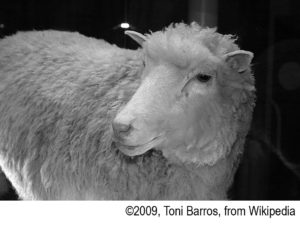You may remember the sensation created when it was announced that a scientific laboratory had actually used cloning techniques to produce Dolly the sheep in 1996.
For research on brain diseases like Alzheimer’s, more predictive treatment would result if research were conducted on primates because of the similarity of their brains to ours. Besides, cloned primates (which would each have an identical DNA makeup) would remove the uncontrolled variable of genetic differences and reduce the number of animals needed for any given study.

For more than twenty years since Dolly there have been successful clones of other animals, but no one had ever cloned a primate—until now. The Chinese Academy of Sciences Institute of Neuroscience has announced the world’s first primate clones, macaques named Zhong Zhong and Hua Hua.
Of course, the question on everyone’s mind is how long will it be before there will be human clones? Clearly that raises serious ethical issues. Cloning often results in birth defects and most clones die before birth. In the case of the cloned macaques only 2 out of 109 embryos made it!
Humans are not just another laboratory animal. The Bible says we are created “in His own image” (Genesis 1:26-27). This means that God views human life as distinct from all other animals, sacred and eternal. On the other hand, animal experimentation is justified by many under the principle of “greater good”; that is, the knowledge gained thereby saves many human lives. It is clear that Christians have a responsibility to apply biblical wisdom to the inevitable future public policy debate over human cloning.
Source: Answers Magazine, Vol. 13, No. 3; May-June, 2018. Pages 29-30.



